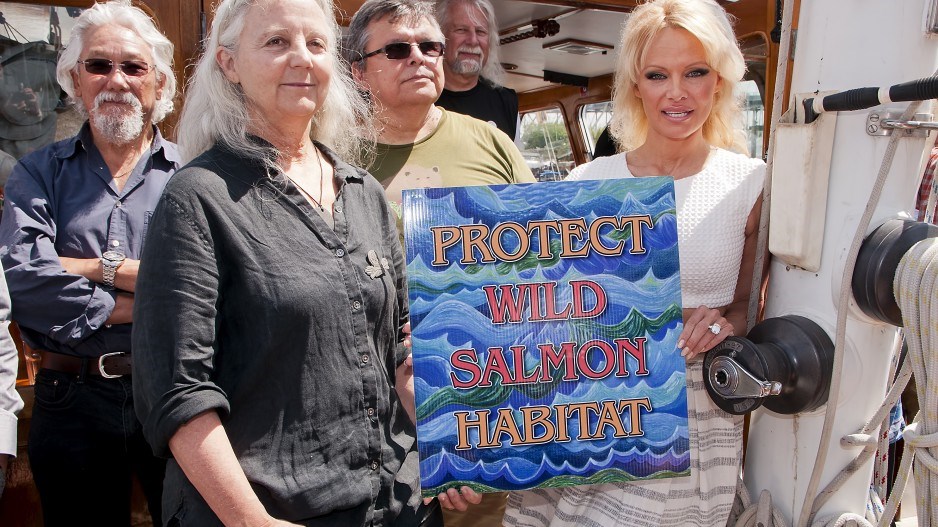Pamela Anderson, the former B.C. actress of Baywatch fame, is lending her name to the maritime activist group, the Sea Shepherd Conservation Society, and anti-fish-farm campaigner Alexandra Morton in a new campaign targeting B.C. fish farms.
Anderson joined Morton, along with David Suzuki and two B.C. First Nations spokesmen, aboard the Sea Shepherd’s R/V Martin Sheen July 18 for a press conference, where they explained their plans to “audit” fish farms along the B.C. coast.
Under the aegis Operation Virus Hunter, Morton will travel aboard the Martin Sheento areas along the coast that host Atlantic salmon farms taking samples to look for piscine reovirus. The research is aimed at trying to determine if the virus can spread from fish farms to wild stocks and cause disease.
The Sea Shepherd Conservation Society – founded by activist Paul Watson – is best known for its aggressive tactics on the high seas when confronting whaling vessels.
“Salmon farms do not belong in the ocean,” Morton said. “This is a dirty industry. I have science, law, public opinion on my side. The salmon farming industry has our government.
“So when Paul Watson surprised me with a post on Facebook saying he was sending this beautiful ship and crew to help me check wild salmon farms, at first I was afraid to say yes. But then I realized this is what has to be done.”
Although the campaigners say the Operation Virus Hunter survey will be done in a “non-aggressive and non-harassing manner,” Jeremy Dunn, executive director for the BC Salmon Farmers Association (BCSFA) said, “Sea Shepherd has a reputation, so our farmers are concerned. We’re concerned for the safety of our farmers and our fish.”
Morton is a biologist who was studying Orca whales in the Broughton Archipelago more than 15 years ago when she discovered what she thought might explain a near collapse of Broughton Archipelago pink salmon in 2002.
Morton’s research pointed to a link between sea lice from fish farms and mortality rates in wild salmon. Her work has given considerable momentum to anti-fish farming campaigns like Farmed and Dangerous.
“The bottom line is that fish farms in the oceans are polluting the oceans, spreading sea lice and killing the wild populations of salmon,” Anderson said at today’s press conference.
A number of fisheries biologists disagree, saying there is little evidence that sea lice transmitted from farmed salmon to wild stocks are responsible for high mortality rates in wild salmon.
A study published in the Proceedings of the National Academy of Sciences in 2010, for example, concluded there is little if any evidence that sea lice were responsible for high mortality in pink salmon, and that “all published field and laboratory data support the conclusion that something other than sea lice caused the population decline in 2002.”
Gary Marty, senior fisheries pathologist for the BC Ministry of Agriculture, co-authored the 2010 study. If sea lice from fish farms were to blame for wild stock mortality, he questions why the 2001 returns were so robust.
“In 2000, the fish farms probably hosted, we think, the second highest level of sea lice they ever had in the last decade, and in 2001 the odd-year (pink salmon) run returned at the highest ever recorded,” he said.
Morton has lately switched her focus from sea lice to piscine reovirus – a virus that can be transmitted from farmed to wild salmon. She and others have suggested federal scientists are not doing their jobs doing the research that’s needed.
David Suzuki said Morton has being doing science that “should be our government’s responsibility.”
In fact, Fisheries and Oceans Canada in May launched a new study of fish diseases in wild, hatchery and farmed salmon on the B.C. coast.
The Strategic Salmon Health Initiative is an eight-year-long, $9 million study that’s being funded by Fisheries and Oceans, the Pacific Salmon Foundation and Genome BC. It will be looking at a wide range of pathogens in fish.
Morton said that First Nations in the areas she will be studying have come forth to voluntarily provide farmed salmon for her to sample, but said she will also be testing other species, not just salmon, for piscine reovirus.
“The way we’re going to do this audit is to look for the virus in other creatures coast-wide and (to see) if there is a hotspot for piscine reovirus, or is it spread all the way around the coast?” she said.
She said she will also try to determine how many farmed fish are in open net pens and will also look for things like algae blooms.
Morton said she will be doing the sampling but that the testing will be done by various labs. Asked if her studies will be subjected to peer-reviewed publishing, she said it would.
“All the science I publish is subject to peer review,” she said.




